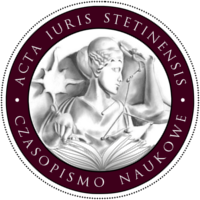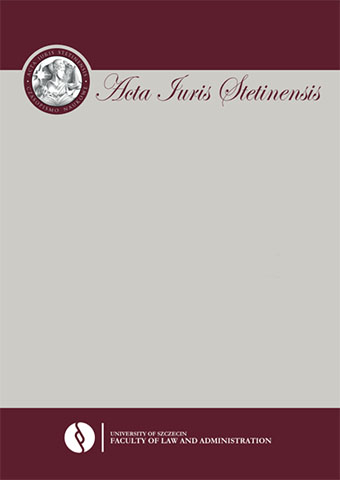







| Authors: |
Michał
Kasiński

State College of Applied Sciences in Skierniewice, University of Lodz |
| Keywords: | religious education public education freedom of conscience and religion ideological neutrality of public authorities UN Human Rights Committee European Court of Human Rights |
| Data publikacji całości: | 2019 |
| Page range: | 20 (79-98) |
| Downloads ?: | 362 |
| 1. | Brzozowski, W., Bezstronność światopoglądowa władz publicznych w Konstytucji RP, Warszawa 2011. |
| 2. | Brzozowski, W., Glosa do wyroku Trybunału Konstytucyjnego z dnia 2 grudnia 2009 r., U 10/07, “Przegląd Sejmowy” 2010, No. 4. |
| 3. | Florczak-Wątor, M., Art.53 [Wolność sumienia i wyznania], in: Tuleja, P. (ed.), Konstytucja Rzeczypospolitej Polskiej Komentarz, Warszawa 2019. |
| 4. | Góralski, W., Pieńdyk, A., Zasada niezależności i autonomii państwa i Kościoła w konkordacie polskim z 1993 r., Warszawa 2007. |
| 5. | Kasiński, M., Ochrona wolności sumienia i wyznania, in: Duniewska, Z. (ed.) et al., Prawo administracyjne materialne, Warszawa 2019. |
| 6. | Mezglewski, A., Nauczanie religii w publicznych przedszkolach i szkołach, in: Mezglewski, A., Misztal, H., Stanisz, P., Prawo wyznaniowe, Warszawa 2011. |
| 7. | Nowicki, M.A., Wokół Konwencji Europejskiej. Komentarz do Europejskiej Konwencji Praw Człowieka, Warszawa 2017. |
| 8. | Pietrzak, M., Państwo laickie, “Przegląd Humanistyczny” 1990, No. 8–9, reprint: Pietrzak, M., Demokratyczne, świeckie państwo prawne, Warszawa 1999. |
| 9. | Sobczak, W., Wolność myśli, sumienia i religii. Poszukiwanie standardu europejskiego, Toruń 2013. |
| 10. | Statement of the EPC: Religious education not is an optional subject. Classes can take place in the middle of the school day, 18.03.2019, Gazeta.pl. |
| 11. | Suchecka, J., Kuria straszy rodziców. Wypisałeś dziecko z religii? “To pisemna apostazja”, 9.09.2014, Wyborcza.pl. |
| 12. | Wieruszewski, R., Nauczanie religii w szkołach publicznych oraz finansowanie szkół religijnych w świetle orzecznictwa Komitetu Praw Człowieka ONZ, in: Wieruszewski, R., Wyrzykowski, M., Kondratiewa-Bryzik, L. (eds.), Prawne granice wolności sumienia i wyznania, Warszawa 2012. |
| 13. | Zieliński, T., Zakaz indoktrynacji światopoglądowej w szkolnictwie według wyroku Lautsi przeciwko Włochom, in: Wieruszewski, R., Wyrzykowski, M., Kondratiewa-Bryzik, L. (eds.), Prawne granice wolności sumienia i wyznania, Warszawa 2012. |
| 14. | Act of 10 June 2015 on specific conditions and grading, classifying and promotion schemes for students and course participants at public schools, Dz. U. (Journal of Laws) of 2019, item 372. |
| 15. | Act of 17 May 1989 on guarantees of freedom of conscience and belief, Dz. U. (Journal of Laws) of 2017, item 1153. |
| 16. | Act of 17 May 1989 on the relations of the State and the Catholic Church in the Republic of Poland, Dz. U. (Journal of Laws) of 2018, item 380, as amended. |
| 17. | Act of 2 April 1997 Constitution of the Republic of Poland, Dz. U. (Journal of Laws) of 1997 No. 78, item 483, as amended. |
| 18. | Act of 20 November 1989 on ratifying the UN Convention on the Rights of the Child, Dz. U. (Journal of Laws) of 1991 No.120, item 526, as amended). |
| 19. | Act of 28 July 1993 Concordat between the Holy See and Poland, Dz. U. (Journal of Laws) of 1998 No. 51, item 318. |
| 20. | Act of 7 September 1991 on the education system, Dz. U. (Journal of Laws) of 2019, item 1481, as amended. |
| 21. | Constitutional Tribunal ruling of 2 December 2009, U 10/07, OTK-A 2009 No. 11, item 1630. |
| 22. | Council of Europe, European Convention for the Protection of Human Rights and Fundamental Freedoms, as amended by Protocols Nos. 11 and 14, 4 November 1950, ETS 5. |
| 23. | Directive of the Minister of National Education of 13 July 2007 amending the directive on the conditions and the ways of assessment, classifying and promoting students and conducting tests and examinations in Public schools, Dz. U. (Journal of Laws) of 2007 No.130, item 906. |
| 24. | Directive of the Minister of National Education of 14 April 1992 on the conditions and ways of organizing religious education lessons in public schools and pre-school, Dz.U. (Journal of Laws) of 1992 No. 36, item 155, as amended. |
| 25. | European Union, Charter of Fundamental Rights of the European Union, OJ C 326, 26.10.2012, p. 391–407. |
| 26. | Organization for Security and Co-operation in Europe (OSCE), Conference on Security and Co-operation in Europe (CSCE): Final Act of Helsinki, 1 August 1975. |
| 27. | Regulation of the Ministry of Education of 14 April 1992 on conditions and ways of organizing religious education in public pre-schools and schools, Dz. U. (Journal of Laws) of 1992 No. 36, item 155. |
| 28. | UN General Assembly, International Covenant on Civil and Political Rights, 16 December 1966, United Nations, Treaty Series, vol. 999, p. 171. |
| 29. | UN General Assembly, International Covenant on Economic, Social and Cultural Rights, 16 December 1966, United Nations, Treaty Series, vol. 993, p. 3. |
| 30. | Polish Commissioner for Human Rights, Speech to the Minister of National Education of 20/9/2018. Letter No. XI.5601.4.2016.JS. |
| 31. | Polish Commissioner for Human Rights, Statement of 15 November 2013, reference number RPO/601727/08/1/104122. http://www.sprawy-generalne.brpo.gov.pl. |
| 32. | ECtHR, Angeleni v. Sweden, Application no. 1049/83, 3 December 1986. |
| 33. | ECtHR, Bernard v. Luxembourg, Application no. 17187/90, 8 September 1993. |
| 34. | ECtHR, C.J., J.J., E.J. v. Poland, Application no. 23380/94, 16 January 1996. |
| 35. | ECtHR, Folgero and Others v. Norway, Application no.15472/02, the Grand Chamber, 29 June 2007. |
| 36. | ECtHR, Grzelak v. Poland, Application no. 7710/02, 22 November 2010. |
| 37. | ECtHR, Hasan and Eylem Zengin v. Turkey, Application no. 1448/04, 7 October 2007. |
| 38. | ECtHR, Hasan and Eylem Zengin v. Turkey, Application no. 1448, 9 January 2008. |
| 39. | ECtHR, Izzettin Dogan and Others v. Turkey, Application no. 62649/10, 26 April 2016. |
| 40. | ECtHR, Kjeldsen, Busk Madsen and Petersen v. Denmark, Application no. 5095/71; 5920/72; 5926/72, 7 December 1976. |
| 41. | ECtHR, Lautsi and others v. Italy, Application no. 30814/06, Grand Chamber, 18 March 2011. |
| 42. | ECtHR, Mansur Yalcin and Others v. Turkey, Application no. 21163/11, 16 September 2014. |
| 43. | Nauczanie religii w polskiej szkole, 10.01.2019, https://ekai.pl/nauczanie-religii-w-polskiejszkole-2. |
| 44. | Pacewicz, P., MEN: nauczanie religii kosztowało w 2018 roku 1,48 mld. OKO.press: katecheta zarabia średnio 4960 zł, 22.04.2019, https://oko.press/men-nauczanie-religii-kosztowalo-w-2018-r-148-mld-oko-press-katecheta-zarabia-srednio-4960-zl. |